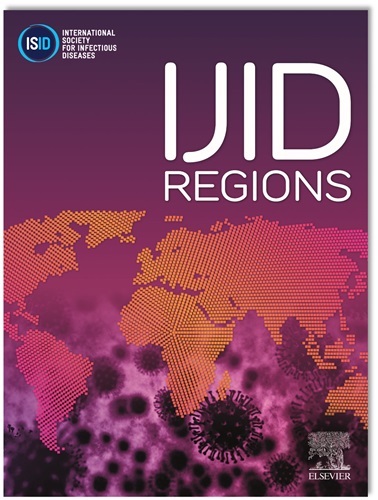Navigating troubled waters: a systematic review of prosthetic valve endocarditis reported cases treated with suppressive antimicrobial treatment
IF 4.8
2区 医学
Q1 INFECTIOUS DISEASES
引用次数: 0
Abstract
Objectives
We aimed to characterize suppressive antimicrobial treatment (SAT) for non-surgical candidate patients with prosthetic valve endocarditis (PVE).
Methods
We systematically reviewed PubMed and Embase databases for studies reporting individual data on patients with PVE medically treated for longer than 8 weeks published until the 31st of June 2024. The review protocol was registered on PROSPERO database [CRD42024529650].
Results
One hundred seventy patients were retrieved from 91 studies. PVE-related death during follow-up occurred in 26 (15.57%) patients, being associated with coagulase-negative staphylococci PVE in multivariate Cox regression model (HR 3.40, 95% CI 1.06-10.97, P-value = 0.04). Relapse occurred in 15 (8.92%) patients and was similar according to SAT discontinuation (long-rank test P-value = 0.8). This was confirmed after performing landmark analysis to adjust for survival bias (HR 0.97; 95% CI 0.21-4.4, P-value = 0.98). SAT-related adverse events were reported in 15% of the patients.
Conclusion
Supporting evidence for SAT is low and derived from case reports and case series. SAT seems well tolerated, but clinical effectiveness should be further evaluated due to the relevant mortality rate. In selected cases when SAT discontinuation is considered, close and long-term follow-up is crucial to prevent relapse.
导航浑水:系统回顾人工瓣膜心内膜炎报告的病例与抑制抗菌治疗。
目的:我们的目的是表征抑菌治疗(SAT)非手术候选患者假瓣膜心内膜炎(PVE)。方法:我们系统地回顾了PubMed和Embase数据库中截至2024年6月31日发表的关于治疗超过8周的PVE患者个人数据的研究。审查方案已在PROSPERO数据库中注册[CRD42024529650]。结果:从91项研究中检索到170例患者。多因素Cox回归模型显示,随访期间PVE相关死亡26例(15.57%),与凝固酶阴性葡萄球菌PVE相关(HR 3.40, 95% CI 1.06 ~ 10.97, p值 = 0.04)。15例(8.92%)患者复发,停药后复发情况相似(长秩检验p值0.8)。在进行了里程碑式分析以校正生存偏倚后证实了这一点(HR 0.97;95% CI 0.21 - 4.4, p值0.98)。15%的患者报告了与sat相关的不良事件。结论:支持SAT的证据很少,并且来自病例报告和病例系列。SAT似乎耐受性良好,但由于相关的死亡率,临床疗效应进一步评估。在考虑停用SAT的特定病例中,密切和长期随访对于预防复发至关重要。
本文章由计算机程序翻译,如有差异,请以英文原文为准。
求助全文
约1分钟内获得全文
求助全文
来源期刊
CiteScore
18.90
自引率
2.40%
发文量
1020
审稿时长
30 days
期刊介绍:
International Journal of Infectious Diseases (IJID)
Publisher: International Society for Infectious Diseases
Publication Frequency: Monthly
Type: Peer-reviewed, Open Access
Scope:
Publishes original clinical and laboratory-based research.
Reports clinical trials, reviews, and some case reports.
Focuses on epidemiology, clinical diagnosis, treatment, and control of infectious diseases.
Emphasizes diseases common in under-resourced countries.

 求助内容:
求助内容: 应助结果提醒方式:
应助结果提醒方式:


